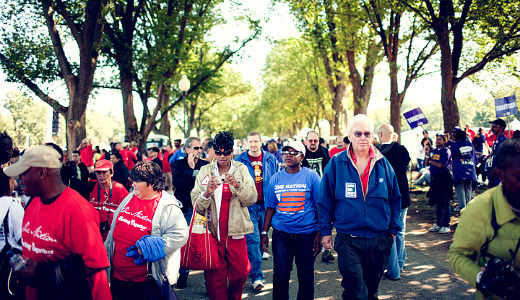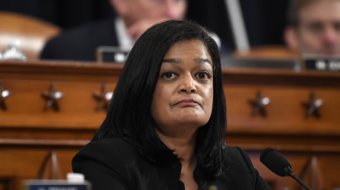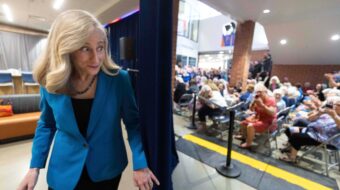
“You’re my fellow American and I love you. You’re my fellow American and I will fight for your family like it’s my own.” Those were the words of Benjamin Jealous, president and CEO of the NAACP, as he delivered an electrifying speech to a crowd numbering over 100,000 people, Oct 2. Despite the remarkably compassionate, uncontroversial nature of Jealous’ and many others’ words at the One Nation rally, conservatives have responded with virtually unanimous and ferocious condemnation.
Detractors of last Saturday’s rally have focused on comparisons with Glenn Beck’s Restoring Honor rally on August 28. The blogosphere erupted with now ubiquitous photographic juxtapositions of the two events, one photo showing Beck’s rally clearly at its height, with the mall full of people and no inch of grass to be found anywhere, the other showing Saturday’s gathering at a time when most protestors had clearly not yet arrived. But with no official estimates, the argument over who had the most people will in all likelihood remain unsolved.
In many ways, however, quibbling over debatable data is irrelevant to One Nation’s message: people before profit. And who, after all, would mount a public opposition to such a message? Certainly not Glenn Beck, who took the opportunity on his Monday show to slam Saturday’s momentous rally without addressing its content.
In a typical exhibition of extreme right-wing hatemongering, Beck characterized One Nation gatherers as anti-American malcontents, “a group of freaks … unengaged, apathetic, and barely paying attention.” Beck went on to claim that, by the time speakers came onto stage, only a hundred people remained, even as footage behind him showed thousands of people milling about before the Lincoln Memorial.
Beck didn’t, however, engage with Ed Schultz’s appeal to Saturday’s remarkably diverse crowd – “Are you American? Do you love America?” – or with the resounding assent that returned in answer. Likewise, Beck avoided altogether any response to Marian Wright Edelman, founder and president of the Children’s Defense Fund, who issued a call to “turn back those who hijack Dr. King’s words but subvert his call to end poverty and excessive militarism.” Edelman ended with the decidedly plain but time-honored injunction to “leave our world better than we found it.” Who could argue to the contrary? Who would denounce a call for more jobs, better education, and peace?
Few could – or even would – which is probably why conservative responses have focused on short-sighted comparisons with Restoring Honor. And of course, many opponents of the One Nation rally have followed Beck’s example in employing archetypal McCarthyism rather than engaging with the ideas that circulated on and off stage last Saturday. Perhaps, in the perpetual push to polarize the electorate, extreme conservative mouthpieces want to avoid the common ground shared between people who consider themselves on the left and those who follow the right – ground that Edelman, Schultz, Jealous, and others explored at length. Perhaps, in fact, the old left-right binary has in many ways lost traction: perhaps we need a new way of speaking to one another that acknowledges our mutual interests and beliefs.
After all, nearly all Americans could agree that cultivating a working, educated, healthy electorate is a good thing – and that Jealous drew from the core of American identity when he asserted, “We know that our nation’s destiny is to move ever forward, never backwards.” Evoking the Pledge of Allegiance, Jealous likewise declared: “We are one nation, indivisible, with liberty, and justice for all.” How, then, with so many patriots, veterans, faithful, and workers in attendance, can Beck and others characterize the One Nation rally as a group of people who have “called for the destruction of America?”
Most Americans seem to draw from the same source, the same rich soil of identity that informs, to one degree or another, all of our views. More importantly, most of us seem to have the same goal in sight (charlatans and corporate interests aside). Gatherers at Saturday’s rally took one step in the right direction, one step towards a conversation that acknowledges our commonality and ceaseless interdependence with one another. And with November’s mid-term elections fast approaching, we would all do well to remember Jealous’ clear and charitable words: “You’re my fellow American and I love you. You’re my fellow American and I will fight for your family like it’s my own.”
Photo: William Massey










